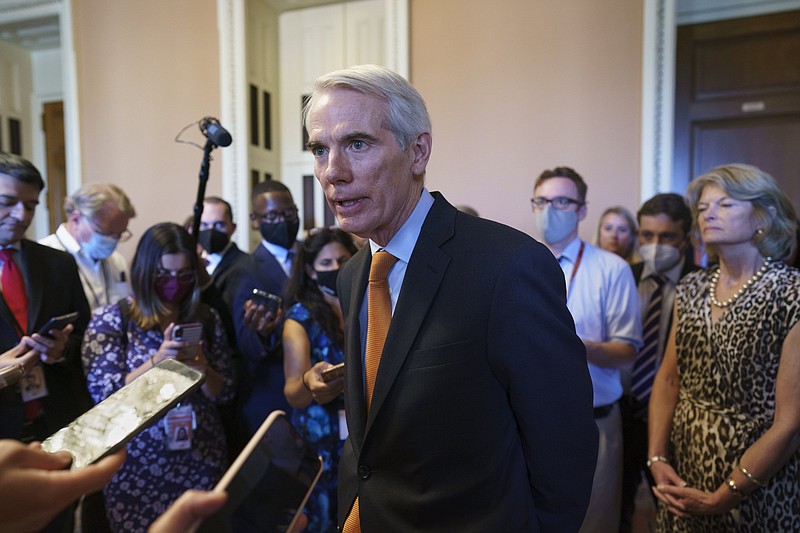WASHINGTON -- The Senate voted Wednesday night to begin work on a nearly $1 trillion national infrastructure plan after President Joe Biden and a bipartisan group of senators reached agreement on major provisions of the package that is a key part of his presidential agenda.
Biden welcomed the accord as one that would show America can "do big things" -- with the most significant long-term investments in nearly a century, he said, on par with building the transcontinental railroad or the interstate highway system.
"This deal signals to the world that our democracy can function," Biden said in a statement. "We will once again transform America and propel us into the future."
The rare bipartisan showing, on 67-32 vote, signaled the interest among senators in starting the process to consider the infrastructure package. But it's unclear if enough Republicans will eventually join Democrats to support final passage. The procedural step Wednesday night is expected to kick-start lengthy consideration.
The day of political breakthroughs began with news of a deal, as a bipartisan bloc of 10 negotiators reached agreement around a package to upgrade the nation's roads, bridges, pipes, ports and internet connections. The announcement from some of the group's leaders, including Sens. Rob Portman, R-Ohio, and Kyrsten Sinema, D-Ariz., capped off a frenetic round of talks that nearly collapsed in behind-the-scenes battles about the spending and how to pay for it.
The agreement soon paved the way for Senate Majority Leader Charles Schumer, D-N.Y., to take the next legislative move: A key procedural vote teeing up the infrastructure measure.
In all, 17 Republican senators joined the Democrats in voting to start debate, but most remained skeptical. The GOP senators were given a thick binder of briefing materials during a private lunch, but they asked many questions and wanted more details.
According to a 57-page GOP summary obtained by The Associated Press, the five-year spending package would be paid for by tapping $205 billion in unspent covid-19 relief aid and $53 billion in unemployment insurance aid some states have halted. It also relies on economic growth to bring in $56 billion, and other measures.
The outcome will set the stage for the next debate over Biden's much more ambitious $3.5 trillion spending package, a strictly partisan pursuit of far-reaching programs and services including child care, tax breaks and health care that touch almost every corner of American life. Republicans strongly oppose that bill, and may try to stop both.
Senate GOP leader Mitch McConnell announced late Wednesday that he would vote to proceed, though whether he will support the final bill remains uncertain. The Republican negotiators met with McConnell earlier Wednesday and Portman said the leader "all along has been encouraging our efforts."
"It's going to help with regards to our roads and our bridges and our ports and waterways, and also helps expand digital infrastructure, broadband," Portman said, adding: "It's very popular."
The twin developments marked an early victory for lawmakers who for years have struggled to turn their shared enthusiasm for infrastructure into actual investments in the country's inner-workings. Several past presidents have called for robust new public-works spending to replace old pipes and fix cracked roads, yet only Wednesday did the Senate actually take a key step toward delivering on those promises.
Yet the progress still threatened to prove politically fragile in a debate that is only just beginning. Lawmakers still must draft their legislation, which had not been written Wednesday afternoon, and calibrate it in a way to survive the narrowly divided Senate. Democrats have plenty of spending they would still like to see added to the package, while Republicans continue to harbor significant concerns about the deficit -- two of many challenges that Senate deal-makers face in keeping their coalition together in the days to come.
The infrastructure deal itself marks a fuller accounting of a blueprint that Senate negotiators first outlined in June. It essentially touches the whole of the U.S. economy, calling for roughly $1 trillion in spending -- over half of which is new, with the rest coming from anticipated federal investments in highways and other roadways that must be adopted every few years by Congress.
The deal includes $40 billion in spending to fix bridges, for example, and $39 billion to modernize transit -- a level of investment the White House on Wednesday called the largest ever in bus and transit systems. It also sets aside about $55 billion for water infrastructure, a sum that the Biden administration said would replace every lead pipe in the U.S. There's another $65 billion to build out broadband internet access to rural areas and help those who have access to the web afford their connections. And it calls for additional amounts to upgrade seaports, airports and waterways in need of investment.
Information for this article was contributed by Tony Romm of The Washington Post and by Lisa Mascaro, Kevin Freking, Alan Fram, Josh Boak and Tali Arbel of The Associated Press.

